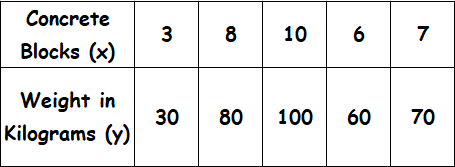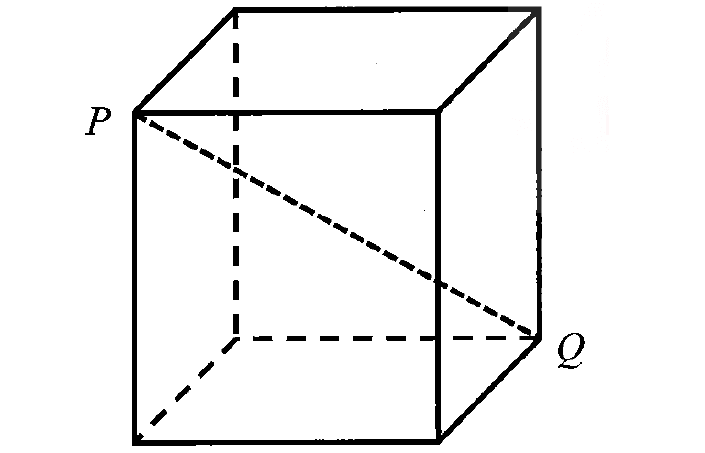FIND THE CONSTANT OF PROPORTIONALITY FROM A TABLE
If the ratio of one variable to the other is constant, then the two variables have a proportional relationship.
If x and y have a proportional relationship, the constant of proportionality is the ratio of y to x.
In this section, you will learn, how to find the constant of proportionality from a table which contains the values of x and y.
Example 1 :
Examine the given table and determine if the relationship is proportional. If yes, determine the constant of proportionality.

Solution :
Find the ratio of x and y for all the given values.
3/30 = 1/10
8/80 = 10
10/100 = 1/10
9/60 = 1/10
7/70 = 1/10
When we take ratio of x and y for all the given values, we get equal value for all the ratios.
Therefore, the relationship given in the table is proportional.
When we look at the above table when x gets increased, y also gets increased, so it is direct proportion.
Then, we have
y = kx
Substitute 3 for x and 30 for y.
30 = k(3)
10 = k
So, the constant of proportionality is 10.
That is, every concrete block weighs 10 kilograms.
Example 2 :
Examine the given table and determine if the relationship is proportional. If yes, determine the constant of proportionality. And also, explain what does the constant of proportionality mean?

Solution :
Find the ratio of x and y for all the given values.
5/15 = 1/3
10/30 = 1/3
6/18 = 1/3
9/27 = 1/3
2/6 = 1/3
When we take ratio of x and y for all the given values, we get equal value for all the ratios.
Therefore, the relationship given in the table is proportional.
When we look at the above table when x gets increased, y also gets increased, so it is direct proportion.
Then, we have
y = kx
Substitute 5 for x and 15 for y.
15 = k(5)
3 = k
So, the constant of proportionality is 3.
That is, for every can of paint, you could paint 3 bird houses.
Example 3 :
Examine the given table and determine if the relationship is proportional. If yes, determine the constant of proportionality. And also, explain what does the constant of proportionality mean?

Solution :
Find the ratio of x and y for all the given values.
9/342 = 1/38
7/266 = 1/38
6/228 = 1/38
8/304 = 1/38
3/114 = 1/38
When we take ratio of x and y for all the given values, we get equal value for all the ratios.
Therefore, the relationship given in the table is proportional.
When we look at the above table when x gets increased, y also gets increased, so it is direct proportion.
Then, we have
y = kx
Substitute 9 for x and 342 for y.
342 = k(9)
38 = k
So, the constant of proportionality is 38.
That is, for every vote for Faye there were 38 votes for Victor.
Example 4 :
Examine the given table and determine if the relationship is proportional. If yes, determine the constant of proportionality. And also, explain what does the constant of proportionality mean?

Solution :
Find the ratio of x and y for all the given values.
6/1212 = 1/202
4/808 = 1/202
10/2020 = 1/202
3/606 = 1/202
8/1616 = 1/202
When we take ratio of x and y for all the given values, we get equal value for all the ratios.
Therefore, the relationship given in the table is proportional.
When we look at the above table when x gets increased, y also gets increased, so it is direct proportion.
Then, we have
y = kx
Substitute 6 for x and 1212 for y.
1212 = k(6)
202 = k
So, the constant of proportionality is 202.
That is, every chocolate bar has 202 calories.
Example 5 :
Examine the given table and determine if the relationship is proportional. If yes, determine the constant of proportionality. And also, explain what does the constant of proportionality mean?

Solution :
Find the ratio of x and y for all the given values.
7/14 = 1/2
8/16 = 1/2
6/12 = 1/2
10/20 = 1/2
2/4 = 1/2
When we take ratio of x and y for all the given values, we get equal value for all the ratios.
Therefore, the relationship given in the table is proportional.
When we look at the above table when x gets increased, y also gets increased, so it is direct proportion.
Then, we have
y = kx
Substitute 6 for x and 1212 for y.
1212 = k(6)
202 = k
So, the constant of proportionality is 202.
For each piece of chicken it costs 2 dollars.
Example 6 :
Examine the given table and determine if the relationship is proportional. If yes, determine the constant of proportionality. And also, explain what does the constant of proportionality mean?

Solution :
Find the ratio of x and y for all the given values.
16/8 = 2
24/12 = 2
12/6 = 2
20/10 = 2
4/2 = 2
When we take ratio of x and y for all the given values, we get equal value for all the ratios.
Therefore, the relationship given in the table is proportional.
When we look at the above table when x gets increased, y gets decreased, so it is inverse proportion.
Then, we have
y = k/x
Substitute 16 for x and 8 for y.
8 = k(16)
1/2 = k
So, the constant of proportionality is 1/2.
Example 7 :
Examine the given table and determine if the relationship is proportional. If yes, determine the constant of proportionality. And also, explain what does the constant of proportionality mean?

Solution :
Find the ratio of x and y for all the given values.
2/32 = 1/16
5/80 = 1/16
9/144 = 1/16
7/144 = 1/16
10/160 = 1/16
When we take ratio of x and y for all the given values, we get equal value for all the ratios.
Therefore, the relationship given in the table is proportional.
When we look at the above table when x gets increased, y gets decreased, so it is inverse proportion.
Then, we have
y = kx
Substitute 2 for x and 32 for y.
32 = k(2)
16 = k
So, the constant of proportionality is 16.
That is, for every box of candy you get 16 pieces.
Kindly mail your feedback to v4formath@gmail.com
We always appreciate your feedback.
©All rights reserved. onlinemath4all.com
Recent Articles
-
Digital SAT Math Problems and Solutions (Part - 151)
Apr 26, 25 11:18 AM
Digital SAT Math Problems and Solutions (Part - 151) -
AP Calculus BC Problems with Solutions
Apr 26, 25 05:49 AM
AP Calculus BC Problems with Solutions -
Digital SAT Math Problems and Solutions (Part - 150)
Apr 25, 25 11:46 AM
Digital SAT Math Problems and Solutions (Part - 150)
